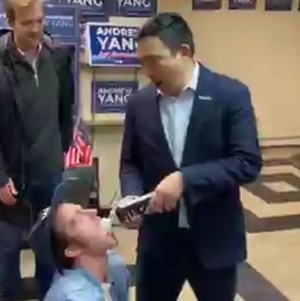Today the Court issued opinions in United States v. Hansen, United States v. Texas, Coinbase, Inc. v. Bielski, and Samia v. United States.
The most high-profile of these was Texas, a case in which that state (and Louisiana) sued the federal government/Biden administration after it issued new immigration enforcement guidelines which "prioritized the arrest and removal from the United States of noncitizens who are suspected terrorists or dangerous criminals, or who have unlawfully entered the country only recently." The Biden administration was using its Executive enforcement discretion in interpret (loosely) a Congressional statute requiring (to quote Alito's dissent) "the apprehension and detention of certain illegal aliens whose release, it thought, would endanger public safety." Texas and Louisiana promptly sued, saying that the Executive Branch was mandated by that statute to make more arrests than it planned to under the guidelines.
Every justice except for Alito sided with the government and said that Texas did not have standing to bring this case, for slightly different reasons. In the majority opinion, Kavanaugh, joined by Roberts and the liberals, wrote that Texas did not have a "judicially cognizable interest" in making the Executive Branch arrest more undocumented immigrants, given that Branch's "traditional discretion over whether to take enforcement actions against violators of federal law."
Gorsuch, Barrett and Thomas would find that Texas (and Louisiana) had "suffered a concrete and particularized injury" by the Biden administration choosing to make less immigration enforcement arrests, and thus that they had a "judicially cognizable interest." However, they found that the injury was not redressable by a federal court's ruling, which is to say, that the federal court is not empowered to make a ruling that would have the effect of forcing the Biden administration to make more arrests.
Alito, writing only for himself, says that everyone else is tripping: the concurrent are wrong about redressability, as the Supreme Court itself is enabled to set aside the Biden administration's Final Memorandum issuing the new guidelines, which would have the effect of fixing the harm.
He then accuses the majority of, more seriously, "adopting the remarkable rule that injuries from an executive decision not to arrest or prosecute, even in a civil case, are generally not “cognizable," saying that it trashes the Court's precedents on Article III standing and "improperly inflates" the power of the Executive over Congress's rightful control of immigration policy (enacted via the statute in this case). He also claims that this case is impossible to honestly square with last year's decision in Biden v. Texas, where Texas was ruled to have standing to challenge the Biden administration's ending of the Remain in Mexico policy. (On this last point, I find it hard to disagree that the cases do not seem distinguishable with regards to Texas's standing to sue).
The other three cases are also important but I already spent long enough summarizing this one.
amylhowe.com/2023/06/27/the-seven-remaining-cases
The seven remaining cases. For anyone who reads this in the next 25 minutes, I think they knock four of them out today and leave for tomorrow the affirmative action cases and 303 Creative. Perhaps the student loan cases are tomorrow and 303 Creative is today; however, I'm almost certain they will wait as long as possible for the affirmative action cases.
Students for Fair Admissions v. University of North Carolina (argued Oct. 31, 2022): Students for Fair Admissions, the group bringing the lawsuit, contends that UNC violates the 14th Amendment’s equal protection clause, which bars racial discrimination by government entities, by considering race in its admissions process when it does not need to do so to achieve a diverse student body. Three justices – Chief Justice John Roberts and Justices Samuel Alito and Brett Kavanaugh – have not yet written opinions for the court’s November argument session, but Kavanaugh has already written seven opinions (more than any other justice), so Roberts and/or Alito are the most likely authors for the UNC and Harvard cases.
Students for Fair Admissions v. Harvard College (argued Oct. 31, 2022): This is a lawsuit brought by Students for Fair Admissions, the same group that filed the lawsuit against UNC, alleging that Harvard violates Title VI of the Civil Rights Act, which bars entities that receive federal funding from discriminating based on race, because Asian American applicants are less likely to be admitted than similarly qualified white, Hispanic, or Black applicants. Justice Ketanji Brown Jackson, who until recently served on Harvard’s board of overseers, recused herself from the case.
303 Creative v. Elenis (argued Dec. 5, 2022): In this case, the justices are grappling with the tension between legal protections for LGBTQ people and the rights of business owners who are opposed to same-sex marriage. Lorie Smith, a Colorado website designer, is a devout Christian who believes that marriage is limited to unions between heterosexual couples only. She wants to expand her business to include wedding websites, but does not want to create wedding websites for same-sex couples. She seeks a declaration that Colorado cannot enforce its anti-discrimination law against her. Only Justice Neil Gorsuch has not yet written an opinion for the court’s December argument session, so he is the most likely author.
Biden v. Nebraska (argued Feb. 28, 2023): One of two challenges to the Biden administration’s student-debt relief plan, this case was filed by six states with Republican attorneys general. The debt relief plan relied on the HEROES Act, a law passed after the Sept. 11 attacks that gives the Secretary of Education the power to respond to a “national emergency” by “waiving or modifying any statutory or regulatory provision” governing the student-loan programs so that borrowers are not “placed in a worse position financially” as a result of the emergency. The states contend that the HEROES Act does not give the secretary of education the power to implement the debt relief program and, moreover, that the program violates the laws governing federal agencies. Before the justices can consider those questions, however, they must decide whether the states have a legal right to sue at all. The states’ primary argument is that one of the challengers, Missouri, controls one of the largest holders and servicers of student loans in the country. If the program is allowed to go forward, the states say, it could cost the agency as much as $44 million each year. The student loan cases are the only cases from the court’s February argument session that have not yet been decided. However, there are six justices who have not yet written for the court’s February session – Roberts, Alito, Gorsuch, and Justices Elena Kagan, Amy Coney Barrett, and Ketanji Brown Jackson – so one (or two) of those justices is likely writing in the student loan cases.
Department of Education v. Brown (argued Feb. 28, 2023): The second challenge to the debt relief program comes from two individual student-loan borrowers. One is not eligible for any relief under the Biden plan because she does not have any federal student loans, while the other cannot obtain the full $20,000 in relief available to some borrowers under the Biden plan. They too question the Biden administration’s reliance on the HEROES Act, but they too must first overcome questions about their right to sue.
Abitron Austria GmbH v. Hetronic Int’l (argued Mar. 21, 2023): Under the Lanham Act, an individual who “uses in commerce” a trademark that she does not own in a manner that is likely to cause consumer confusion can face civil liability. The question before the justices in this case is whether and when the Lanham Act applies to trademark infringement that occurs outside the United States. Justice Sonia Sotomayor is the only justice who has not yet written an opinion from the court’s March argument session.
Groff v. DeJoy (argued April 18, 2023): In the case of an evangelical Christian who declined to work as a postal carrier on Sundays, the justices are considering how far employers must go to accommodate the religious practices of their employers. Under federal law, employers cannot discriminate against workers for practicing their religion unless the employer can show that the worker’s religious practice cannot “reasonably” be accommodated without “undue hardship.” The former postal worker, Gerald Groff, has asked the justices to overturn a 1977 decision indicating that an “undue hardship” is anything that would require more than a trivial or minimal cost. Alito is the only justice who has not yet written an opinion from the court’s April argument session, so he is the likely author in Groff’s case.
@op
Counterman v Colorado was overruled with a non-partisan align of 7-2; Barrett & Thomas the only dissenters. Have essentially declared online harassment is legal so long as there is no provable metric of intent for violence attached to speech. krishna bound
krishna bound@op
Counterman v Colorado was overruled with a non-partisan align of 7-2; Barrett & Thomas the only dissenters. Have essentially declared online harassment is legal so long as there is no provable metric of intent for violence attached to speech.Yeah I read that decision. The good guys won
First one is Abitron v. Hetronic, naturally the least sexy one... unanimous decision not to apply the particular provisions of the Lanham Act (trademark infringement) at issue extraterritorially
Groff is unanimous -- the Court says that Title VII of the Civil Rights Act of 1964 requires employers to accommodate the religious practice of their employees unless doing so would impose an “undue hardship on the conduct of the employer’s business.”
 gabapentin
gabapentinGroff is unanimous -- the Court says that Title VII of the Civil Rights Act of 1964 requires employers to accommodate the religious practice of their employees unless doing so would impose an “undue hardship on the conduct of the employer’s business.”
So is this yes or no that Christians don't have to work Sundays?
SCOTUSBlog TikTok livestream says that the court holds that Harvard and UNC's admissions programs violate the equal protection clause of the 14th Amendment.
 gabapentin
gabapentinSCOTUSBlog TikTok livestream says that the court holds that Harvard and UNC's admissions programs violate the equal protection clause of the 14th Amendment.
No, unless it would "impose an undue hardship," which of course is for the lawyers to hash out the meaning of
 HURRY UP K DOG
HURRY UP K DOGSo is this yes or no that Christians don't have to work Sundays?
Sorry my response above was to you
@op
seems they just curbed most of AA lol krishna bound
krishna bound@op
seems they just curbed most of AA lolYeah I'm reading the opinion and its not looking like Grutter is properly overturned... anti-Grutter bros did we get too cocky
 gabapentin
gabapentinYeah I'm reading the opinion and its not looking like Grutter is properly overturned... anti-Grutter bros did we get too cocky
they half-assed it on both Groff & Grutter
didn't repeal either but curbed / further regulated their usages essentially
i don't fully get the Groff decision, seems overly ambigious krishna bound
krishna bound@op
seems they just curbed most of AA lolI’m glad
What part of AA was kept?
Also I thought you couldn’t tell private colleges how to admit students?
 CloudyDreams
CloudyDreamsI’m glad
What part of AA was kept?
Also I thought you couldn’t tell private colleges how to admit students?
technically it's still legal but there's a incredibly high standard for legality which has to be met which is near impossible in practicality
 CloudyDreams
CloudyDreamsI’m glad
What part of AA was kept?
Also I thought you couldn’t tell private colleges how to admit students?
You can under Title VI of the Civil Rights Act ("No person in the United States shall, on the ground of race, color, or national origin, be excluded from participation in, be denied the benefits of, or be subjected to discrimination under any program or activity receiving Federal financial assistance.")
 gabapentin
gabapentinYou can under Title VI of the Civil Rights Act ("No person in the United States shall, on the ground of race, color, or national origin, be excluded from participation in, be denied the benefits of, or be subjected to discrimination under any program or activity receiving Federal financial assistance.")
Interesting. So essentially a private university would still be free to admit students in this way if they refused any federal assistance they’re currently getting aka basically an impossibility
 gabapentin
gabapentinYou can under Title VI of the Civil Rights Act ("No person in the United States shall, on the ground of race, color, or national origin, be excluded from participation in, be denied the benefits of, or be subjected to discrimination under any program or activity receiving Federal financial assistance.")
If I understand correctly i believe the ruling essentially says it’s okay to give consideration to race for a program so long as it’s not counter-balanced by the lack of another race receiving the same benefit elsewhere? So I.e. if a school does a “black accelerator” program for raised black admissions there essentially has to be Asian/hispanic/white/etc ones as well, they can’t just do it based around differential racial programs individual of each other


